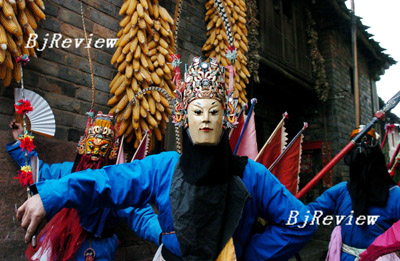 |
|
CULTURAL TREASURE: In southwestern Guizhou Province, a performer of Dixi, an ethnic folk drama, teaches his students vocal skills and stage moves of the art which dates back thousands of years (YANG JUNJIANG) |
On March 22, a group of scholars from Canada and China met at Qinghai Nationalities Institute in the western Province of Qinghai to exchange ideas on how to protect the history and culture of ethnic minority groups. Speaking at the international conference, Professor Jia Yinzhong from Southwest University for Nationalities expressed worry about the inadequate protection given to the spoken and non-material cultural heritage of China's ethnic minorities.
Jia said that many of the traditions and languages of ethnic minorities are on the verge of extinction because of a lack of inheritors. In many villages, the number of people who can talk in their mother tongue has been steadily declining. In Guizhou Province in southwest China, home to around 50 ethnic groups, there used to be over 30 villages where Miao people conversed in the Miao language. Now more than a third of these villages have switched to other languages.
As one of the oldest ethnic groups in southwest China, the Gelao people have a population of 500,000, most of whom reside in two counties in Guizhou Province. The Gelao language has no writing system.
"For the time being, only a handful of elderly Gelao people understand the language," said Long Yaohong, dean of a school at Guizhou University for Nationalities. "With economic and social development, almost nobody in the two counties inhabited by Gelao people can speak the language."
In recent years, prompted by scholars, the Chinese Government has enacted and implemented a series of laws, regulations and policies on the protection of ethnic culture. In a general plan on the development of ethnic minority groups by 2010, the government has promised to collect and classify classics in ethnic languages, increase publication and news reporting in ethnic languages and preserve the customs and languages of minority groups of a very small population.
Dondrub Wangben, Vice Minister of the State Ethnic Affairs Commission, said Chinese society has attached unprecedented importance to the preservation of ethnic minority culture.
No successor
Zuochang, literally translated as sitting and singing, is an ethnic stage performance popular in northwestern Ningxia Hui Autonomous Region. As an art dating back hundreds of years, zuochang is on the verge of becoming an art form only seen in museums as there are only two professional performers, Xu Mingzhi and Zhao Jie.
"As I grow older, I have become worried about this stage art after my retirement," said Xu. He faces enormous pressure. On the one hand, he feels one person's strength is not enough to prevent the art form's extinction. On the other hand, he has to create new works to satisfy his audience's increasing demand for the ancient art.
"I started to sing on the stage at the age of 18, but who can succeed me when I cannot sing any longer?" said the 50-year-old Xu.
Xu is not the only person facing such a difficult situation. The problem of having no successors plagues most arts and crafts practiced by China's ethnic minorities. Tan Mingrui, 78, is a celebrated singer in the Tujia language. Tan can sing the folk songs of his ethnic group for three days in a row without repetition. When asked who will learn his art, Tan answered helplessly, "What young people think of is making money. They are unable to learn my songs wholeheartedly."
| 